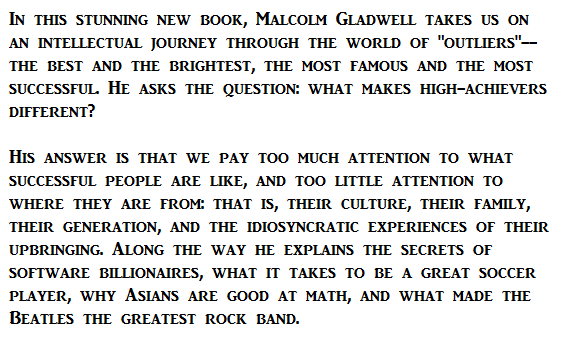
Synopsis:
3.5 out of 5 stars
I'm usually very wary of the books how-to books that focus on subjects as sensitive as success. I'm especially wary of nonfiction based books whose authors are not experts in the topic being discussed and the research presented in the book. I should clarify that Outliers is not a "how-to" book, which is what I originally thought it would be. This is a book that tells different stories of success and how those successes came to be. I enjoyed the first half of the book much more than the second half. This is because a) the stories were more interesting; b) I felt like the author Malcolm Gladwell deviates from the point he was trying to prove in the first half and; c) the connections between the stories made less and less sense to me.
One of the critiques of Outliers is that while the research Gladwell presents was all fine and dandy, it was research he used to prove his points. This is the analyzer's version of what is called "confirmation bias" in the world of scientific research. Confirmation bias is the term used to refer to a researcher's- conscious or unconscious- tendency to slightly influence something in the research he/she is conducting so that the results reflect their hypothesis(es)/ predictions. This is problematic because rather accurately representing real-world phenomena, the research favors the researcher's wants and reflects what the researcher wants it to reflect. I feel like much of this was happening in Outliers. All of the evidence Gladwell provides his readers is cherry-picked.
Another criticism of the book is on some of the content of chapter nine, which is entitled "Marita's Bargain". In this chapter, Gladwell focuses- at least in part- on the achievement gap and the reason it exists. He proposes- and provides evidence to support his claim- that the achievement gap exists because of the differences in the ways students from different economic strata spend their summer vacations. He says, "Schools work. The only problem with school, for kids who aren't achieving, is that there isn't enough of it." Now, I don't any delusions about being an expert on the topic of our complex education system, because I'm certainly not, not by a long shot. However, based on what I've learned in my sociology courses, (thanks, Professor Sung!) while that may be somewhat true (the part about there not being enough school not that schools work), I know that there's much more to it than that. An overwhelming amount of credible research points to the sad state of the education system in the U.S, and more specifically, to the schools in low-income neighborhoods (which are the way they because of the sad state of our education system) as being the reason for the achievement gap.
I liked his incorporation of his own family history and the way he connected that to the moral of the book. The story of Chris Langan, an average (or not so average) citizen with an IQ of over even that of Albert Einstein, is an unfortunate one. The premise of his story is that he's a genius, but life circumstances didn't allow for his genius to be nurtured and shared with the world. But I did some research and found that Langan's article was published in a scholarly journal in March 2017! Yay! It took the scientific community a good long while to realize this man's genius, but better late than never I suppose.






Comments
Post a Comment